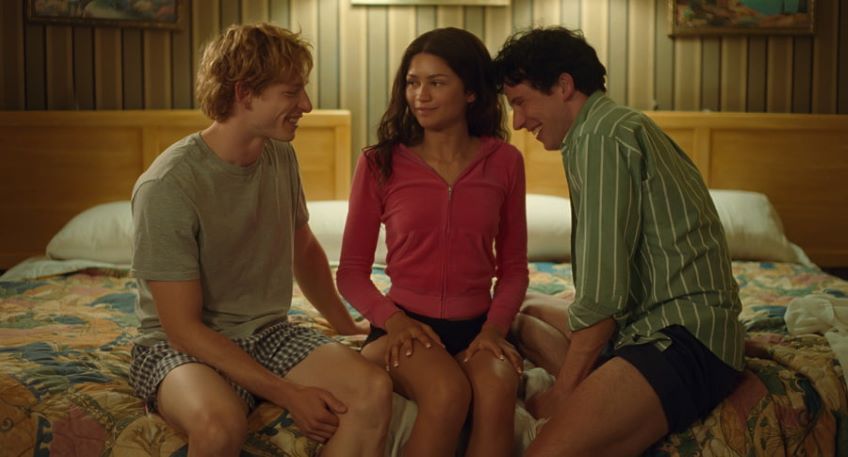Joyce Glasser reviews Challengers (April 26, 2024) Cert 15, 131 mins. In cinemas and on Amazon
Seven years ago the Italian director Luca Guadagnino set our movie screens sizzling with Call Me By Your Name, a coming-of-age story so beautifully written, shot and acted, so psychologically incisive, and so sensual and erotic, that it left you emotionally ravished and in tears. After two English language films shot in the United States, Guadagnino returns to the USA with Challengers, where a love-triangle plays itself out across tennis courts, saunas, and hotel rooms. If there’s no evidence of love or credible emotion on show, there’s a lot of young flesh in Guadagnino’s stylish romp, while his talented crew strive to merge form and content, giving us the feel of watching tennis matches even when we are not.
The film is bookended by an ATP Challenger Match in New Rochelle, featuring Art Donaldson (Mike Faist, Riff in Spielberg’s West Side Story) vs Patrick Zweig (Josh O’Connor, God’s Own Country). Spectator heads go right and left as does the camera but the match is not going as Donaldson’s beautiful wife and coach, Tashi Duncan (Zendaya, Dune I & II) wants, and is about to get worse.
So, the film, as is the match – and any tension or flow in the drama – is interrupted. Not by rain, but by a “two weeks earlier” caption. It is again interrupted by a caption, “13 years earlier”, and then another – “12 years earlier”. These flashbacks piece together the background to the match and the relationship between the three protagonists.

Donaldson is, age wise, approaching the end of his career, but it has stalled. Although he’s a name, he cannot recapture his early promise. Tashi had even greater promise as Stanford University’s ace female player, until an accident on court, which both Art and Patrick witnessed, sent her to the sidelines.
Art is Tashi’s only client and perhaps for cause. At no time do either consider that a professional with some experience on the Grand Slam circuit might be a better coach. In any event Tashi’s strategy is to drop Art down a level to the ATP Challenger Circuit to build his confidence and earnings. She chooses a match in New Rochelle where he is unlikely to meet anyone he knows or anyone who could challenge him.
Enter, Patrick Zweig, who not only knows Tashi and Art, but who has something to prove on the court. With a shambolic career, he is travelling solo, and without the money for a place to stay he sleeps in his car. A staff member who was a judge in the US Juniors remembers Patrick as a boy with great promise. She shares her lunch with the starving athlete and cuts him some slack. Patrick is counting on the money for winning to pay his expenses and is not about to let his rival win.
Tennis, we learn in the dramatised events that separate the captions, which include “3 years later” and even “one day before,” might not be at the core of the rivalry between the two men. After winning their doubles match the two close friends, feeling good, go to watch Tashi who is making a name for herself, looking stunning and smashing her opponent with confidence. They are both smitten – not by her personality as they don’t know her, but by her body, which, in the film, is the equivalent of love.

During a flirtatious meeting at a party she tells them she is not yet turning pro but has opted to play for Stanford University. Then the self-confident, brainy beauty pays the boys a surprise visit in their messy hotel room where she entices the astonished boys into a threesome that gets them hot, but, like the film, is interrupted – by her abrupt departure. A big tease, Tashi will date whoever wins the upcoming match.
So, we follow this under-achieving trio for thirteen years but, if the ever-changing timeline makes it difficult to follow their emotional journey, so too does Tashi’s changes of heart, first dating Patrick, then marrying Art, then risking upsetting Art’s game with a tryst with Patrick. Meanwhile, the two men challenge one another physically in a self-conscious homoerotic sauna scene that is only steamy because of the setting.
The maddening time changes that break the story’s flow are complemented by some jarring editing that cut in the middle of scenes and the attention-grabbing (ball smashing cuts, slow motion, and weird angles) cinematography by that most subtle and skilful of cinematographers, Sayombhu Mukdeeprom.
Mukdeeprom not only shot Call Me by Your Name, and Ron Howard’s cave-rescue film, Thirteen Lives, but the lush, arcane films of Apichatpong Weerasethakul. Here, when the camera isn’t doing stunts, it’s fixated on Zendaya’s cellulite-free buttocks and long, skinny legs. Models’ legs, but not a tennis player’s muscular legs.
The slick but hollow script from first time script-writer Justin Kuritzkes (whose wife Celine Song, wrote the superb and impossibly romantic Past Lives) is, below the surface, surprisingly conservative when it comes to sex. Beyond that, we haven’t a clue why either of the characters are interested in the others. There are never meaningful discussions and Tashi and Art even ignore their young daughter, who is taken out of school, dragged around the circuit but never taken to watch her father play. Except for Tashi’s silent mother, no one has friends or family to shed light on what’s going on with their lives, their true thoughts or their doubts and regrets.
Further adding to the difficulty of following any emotional track, or caring a toss about the characters, is the distracting, thumping techno-club score from Trent Reznor and Atticus Ross, (who won an Oscar for their score of The Social Network). Anyone hard-of-hearing beware: the music seems cued to drown out the dialogue just when the characters begin to speak.




